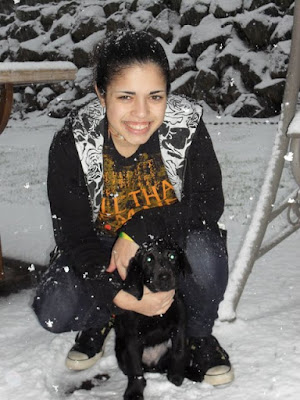By Holly Shumway
The Portland Upside
February 2010
The Portland Upside
February 2010
 Photo by Jessica Levin
Photo by Jessica LevinFor the next 18 months, Alexa is responsible for teaching Delphine basic skills in the puppy’s journey through the Guide Dogs for the Blind program.
Fifteen-year-old Alexa Levin is well aware that her student, Delphine, might just steal her heart. A ten-week-old Labrador retriever, Delphine is in her first stages of training for the Guide Dogs for the Blind Program. Alexa, her “puppy raiser,” is in charge of helping Delphine meet the initial training goals.
Several months before Delphine’s arrival, Alexa and her mother, Jessica, joined a local group affiliated with Guide Dogs for the Blind, whose main campuses are in Boring, Oregon, and San Raphael, California. There are eight different groups in the Portland metropolitan area, throughout Multnomah, Clackamas and Washington counties. Within these groups, there are approximately 120 active puppy raisers.
Jessica happened across the volunteer opportunity and knew that Alexa was a perfect fit.
“Alexa is a natural with dogs. Even as a little girl, Alexa would spend long stretches of time with our family dog, Payton,” says Jessica. “She would crawl under the dinner table, a favorite spot Payton occupied, and curl up beside him, putting her head on his abdomen. The two of them would stay like that for long stretches of time.”
Unfortunately, the Levin family had to put Payton down several years ago due to medical complications.
“It was really hard for my family. We really missed him for a long time,” Alexa shares.
Over the years, Alexa searched for opportunities to interact with dogs. She pet sat for neighbors, knowing she would eventually like to be responsible for her own dog again.
“Dogs just lift up your spirits. When my mom told me about the chance to raise a puppy for the Guide Dog Program, I knew it was what I was looking for.”
On her path to becoming a puppy raiser Alexa attended weekly meetings to learn Guide Dog for the Blind training tips and techniques. She learned grooming and puppy care to prepare her for the anticipated arrival of her trainee. She also worked with other puppies in the group to gain the skills necessary for her own puppy.
“The group offers on-going mentoring and support as well as practice for new puppy raisers. One thing the group does really well is teach raisers how to help their puppies avoid distractions.”
The puppies are exposed to distractions such as other pets and “career change dogs,” those dogs that did not meet the full requirements for the program, but who join the training sessions to try to steer the puppies off course. The trainers spend their time redirecting the puppies by using specific training principles that include proper tone of voice, leash and collar correction, and continuous praise for positive behavior.
Alexa received Delphine the week before Christmas.
“I found out that I would receive my own puppy a few weeks before her arrival. I counted down the days until she arrived. It was hard waiting for her. I was really excited!”
It is now Alexa’s responsibility to teach Delphine good house manners, basic obedience, and how to behave in social situations. Delphine will not receive her green jacket—the official announcement to the world that she is a Guide Dog in Training—until she grows into it. While at the moment Alexa carries a card identifying Delphine as a guide dog puppy in training, the jacket will enable the young dog to accompany Alexa to social events and to school.
Delphine’s readiness will be apparent in two ways.
First, she will need to grow in size to fit the jacket tailored for six-month-old puppies. Second, she will need to grow into her abilities as a trained puppy, which will depend on Alexa’s dedication and persistence
Alexa is experiencing first hand the awesome responsibility she has undertaken to help Delphine meet her goals.
“The first few weeks involved lots of middle of the night bathroom trips, but just this week, she made it all the way through the night. My mom, acting as my guardian, is part of the training. Mom does the training while I am at school. That helps quite a bit.”
Delphine will stay with Alexa for a period of 12 to 18 months. After that Delphine will return to one of the main campuses for pattern training, during which she will navigate and master the ten stages of guide dog training. Alexa will not be able to see her puppy during this phase of training but she will be invited to the graduation ceremony to hand over Delphine’s leash to the new owner.
Pulling Delphine closer Alexa says, “It will be difficult to say goodbye to Delphine when the time comes. I know she will be going into the program to help someone. Knowing this will make it easier. If it was just to say goodbye without knowing this, well, that would be a lot harder.”
_____
To find out more about becoming a puppy raiser for Guide Dogs for the Blind, go to http://guidedogs.com or call 800-295-4050.
Holly is balancing motherhood with graduate school but enjoys sharing the eventful stories community members carry.



No comments:
Post a Comment